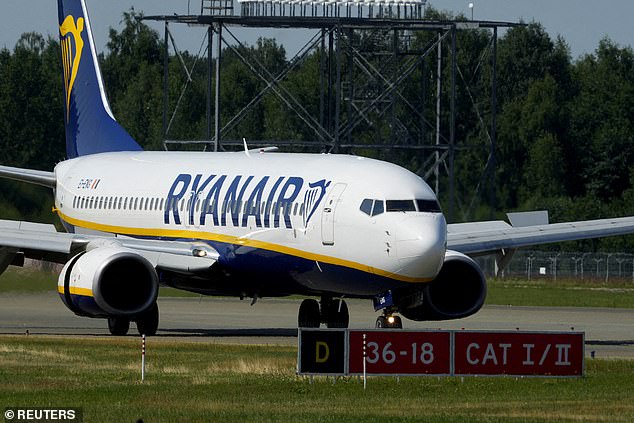- Europe’s largest airline now anticipates annual profits of €1.85-1.95bn
- Ryanair revealed its third-quarter profits plummeted 93% to €15m
- Booking.com and Kayak took Ryanair flights off their sites last month
Ryanair has reduced its annual profit forecast due to rising fuel costs and the removal of its flights from some online travel agents.
Europe’s largest airline now anticipates profits of between €1.85billion (£1.58billion) and €1.95billion (£1.66billion) for the year ending March, after previously guiding for €1.85billion to €2.05billion.
Although the group reported a strong Christmas and New Year peak trading period, fares were lower than expected as many booking sites, including Booking.com and Kayak, took Ryanair flights off their websites in early December.

Lower guidance: Europe’s largest airline now anticipates profits of between €1.85billion (£1.58billion) and €1.95billion (1.66billion) for the year ending March
Ryanair welcomed the move, having previously accused the sites, whom it repeatedly called ‘pirates,’ of overcharging customers, pricing and refund scams, and providing fake contact information.
But it warned last month that the measure would negatively affect short-term fares and load factor – the percentage of seats filled by an airline – as it would be cutting prices to try and boost demand.
The Dublin-based company’s total turnover still grew by 17 per cent to €2.7billion in the three months ending December, thanks to passenger traffic and average fares increasing by 7 per cent and 13 per cent, respectively.
Yet this was offset by soaring fuel bills, which climbed by 35 per cent to €1.2billion (£1billion), with staff expenses and timing of maintenance also contributing to rising operating costs.
As a result, Ryanair’s third-quarter profits plummeted by 93 per cent from €211million the prior year to €15million.
For the current quarter, the group warned sales would be impacted by the ‘partial unwind’ of free ETS (Emissions Trading Scheme) carbon credits’ from the start of January.
In addition, chief executive Michael O’Leary said full-year guidance ‘remains heavily dependent upon avoiding unforeseen adverse events,’ including the conflicts in Ukraine and the Middle East.
Fellow low-cost airlines EasyJet and Wizz Air suspended flights to Israel following the October 7 attacks and observed demand for travel to Jordan and Egypt slow significantly.
O’Leary also cautioned that Ryanair’s results would count on delays in the delivery of new fuel-efficient airplanes as a consequence of extra safety checks.
The company expects to have up to 174 Boeing 737 MAX-8 aircraft, seven fewer than forecasted, by late June, in time for the peak summer season, when it will have 169 new routes on sale.
Ryanair ordered 150 Boeing MAX-10 aeroplanes, with an option for 150 more, in a £32billion deal last year under plans to expand its annual passenger numbers to 300 million by March 2034.
It has told Boeing it would receive delivery of any MAX-10 aircraft cancelled by US airlines ‘at the right price.’
Ryanair shares were 2.4 per cent down this morning at €18.35 on the Euronext Dublin exchange.












